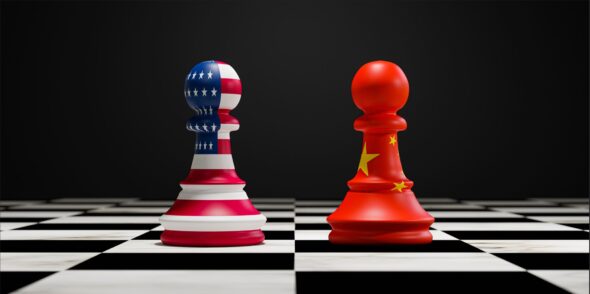Already in January it could be expected that this won’t be an easy year for Huawei. At that time the Chinese telecoms tycoon was facing antipathy in Europe and the United States, which today has negative impact on its results – writes Jędrzej Stachura, editor at BiznesAlert.pl.
A new year, a new Huawei? Not necessarily
Throughout 2020 Huawei was battling image issues and concerns over its market position. Countries from all over the world, one by one, chose whether to become the Chinese company’s opponent or supporter. Half a year has passed and the giant reported a drop in revenue. It went down by 29.5 percent in the first six months of 2021 in comparison to the same period in 2020.
In the first half of 2021 Huawei’s revenue reached CNY 320.4 billion (USD 49.56 billion). In the same period, a year earlier the figure was at CNY 454 billion (USD 70 billion). Yet, the Chinese are denying that the situation is bad. „The net profit margin went up by 9.8 percent in comparison to 9.2 percent in the previous year,” Huawei stressed.
The Huawei CEO Eric Xu stated that the drop was caused by external factors. It was his indirect way of commenting on the American sanctions, which are undermining the company’s ability to acquire the components necessary to manufacture products, especially mobile devices.
In the first half of 2021 Australia banned Huawei from selling 5G equipment to local operators. Thus, the company limited its offer for businesses, because outside of China a large portion of its profit comes from online sales. Xu is hoping that Huawei will balance the losses thanks to the Chinese market and others that are more welcoming for the company.
Huawei is not alone when it comes to the aversion to US sanctions. New restrictions are preventing the affected businesses from cooperating with US companies, but in special cases they may apply for a license. SMIC, China’s leading chip producer, has revealed the US was making it difficult for it to cooperate with the abroad, which undermines logistics and the supply chain. According to the Chinese, the licenses have a huge impact on foreign companies, which want to grow, but cannot, because they don’t have access to American technology.
The eradication of Huawei
Blocking a Chinese company is one thing, but the number of incidents related to Huawei is another. In 2018 Canada detained Meng Wanzhou, the CFO of Huawei, and accused her of unlawful trade transactions. Wanzhou is the daughter of the company’s General Director Ren Zhengfei, and is still battling a US claim for her extradition. The Americans want her to stand trial for fraud and alleged hiding of the company’s business transactions through a daughter company in Iran. If she is extradited to the United States, she can be taken to court and face over 30 years in prison. The entire situation is a source of incessant diplomatic tension between Ottawa and Beijing.
Americans are also interfering with Huawei in other regions of the world. The United States National Security Advisor Jake Sullivan called on Brazil to not use Chinese equipment to develop the 5G network. This warning is a continuation of the campaign initiated two years ago by the former US President Donald Trump. Its goal is to exclude the Chinese from participating in the construction of the 5G wireless networks, and convince America’s allies that Beijing may use this technology for spying.
However, Beijing also knows how to have it own way, which was visible during the dispute with Sweden. A few weeks ago, the Chinese threatened Swedes they would curb their access to the Chinese market if they don’t allow Huawei technology in their country. The Swedes didn’t budge and China kept its word. The message from Bejing is simple: if you stand up to us, you will be punished.
The battered Huawei
After a difficult half a year, Huawei is really battered and it seems that China backing it won’t be enough. It may definitely help in the brawl with the Swedes, but most probably it won’t be enough to win the US approval.
The recent reports about the latest Huawei smartphones may also mean that the company is facing problems. When we purchase a flagship phone which is advertised on billboards with Robert Lewandowski (biggest football player in Poland – ed.), we are not expecting any surprises. And yet the company has stressed the latest model may work slower.
This pertains to the P50 and P50 Pro, which were presented in July 2021. The specifications of the new phones are a lot higher than in the previous generations, thanks to the high frame rate, 6.6-inch OLED screen with a periscope camera with two-side zoom. It needs to be said that the parameters of the Huawei flagship phones are leaving Apple’s iPhone 12 behind. However it’s not all sunshine and rainbows as Huawei’s latest offer includes a network provision, which may discourage potential buyers. This is because the telephone only works in 4G, not 5G. This fact may be disappointing and slightly surprising, because Huawei is the leader when it comes to implementing the fifth generation technology.
Why the limitations? The company has explained that the reason for this are US sanctions and issues with the supply chain. Huawei was not capable of providing P50 components and subcomponents necessary to use 5G. The decision to introduce the product to the 4G market shows that the Chinese have not found profitable, alternative parts at domestic providers.
If Eric Xu admits that the company’s goal is to survive, it means things are not well. The CEO has stated that Huawei wanted to do this through sustainable work, whatever that means. Perhaps it means initiating campaigns, such as the latest one, which was to convince the Biden administration to be more sympathetic towards the Asians. As part of the efforts Tony Podesta, a lobbyist from Washington, was employed by the company. Or perhaps it means writing columns, such as the one penned by Vincent Peng. In a piece entitled „Huawei to Joe Biden: Let’s Talk”, the senior vice president at Huawei begged the US administration to cooperate. Undoubtedly, all of the Huawei actions confirm the company has some respect for Americans, who in recent years have been leading the fight against Chinese technology.
However, the US aversion seems to be justified. Disregarding all of the incidents and petty conflicts in which Huawei is entangled, the facts are that the Chinese company is tightly connected to the government in Beijing. The giant tapped into state subsidies and low-interest loans that are granted by local banks to other countries, so that they can use the company’s telecom equipment. Huawei also cooperated with the Chinese People’s Liberation Army on technologically advanced research projects. This automatically puts the Chinese under American scrutiny, and everything points to the fact that things will stay this way for long.









